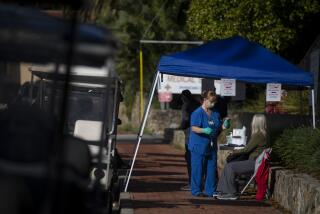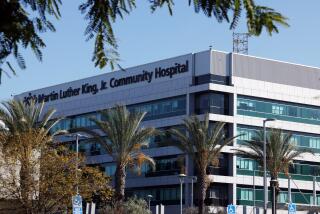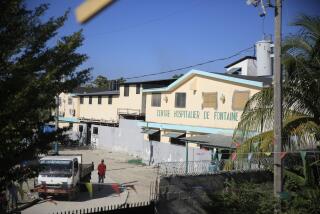Losses May Force French Hospital to Close June 1
Officials at French Hospital in Chinatown said Monday that they will be unable to keep their doors open beyond June 1 without a dramatic infusion of cash to help offset losses of about $3 million last year.
âIâm not sure whether weâd file bankruptcy or just prepare for an orderly close-down,â said Don Carrico, president of the 155-bed facility. The hospital, founded in 1860 to serve the French immigrant settlement that once surrounded it, is in the heart of Chinatown.
Administrators of the facility, still controlled by descendants of those early French immigrants, have called a meeting at the hospital Wednesday with local politicians, health officials and Chinese community leaders, Carrico said, âto get everybody to understand the urgency of this.â
The hospitalâs appeal early this year for local doctors and the Chinatown community to take over hospital operations has generated some response, Carrico said, but no firm commitment. Barring a buyout or merger with another facility, he added, âI donât think we can make it past June 1.â
The hospital, which operated at a profit through 1986, has more recently suffered from three major problems: a drop in revenues because of lower rates of reimbursement from Medicare and Medi-Cal, which are less than rates for private patients; a correspondingly high proportion--close to 90%--of such government-paid patients, and a declining census, as local Chinese doctors have increasingly sent private patients to other hospitals. About 55% of the hospitalâs patients are Asian.
Although French Hospital is relatively small--it averages 65 patients a day--its closure would further restrict access to health care in the downtown Los Angeles area, according to officials at the Hospital Council of Southern California.
Spokesman David Langness said the greatest effect on services would be in the area of obstetrics, as French Hospital delivers about 130 babies a month. Nearby hospitals may be reluctant to shoulder Frenchâs obstetrical load, Langness said, because most of those mothers are Medi-Cal patients with the lower payment rates.
The effect of closure on the availability of emergency services downtown is expected to be negligible. The hospital used to receive about 50 rescue ambulances a month, but it closed its emergency room last fall for financial reasons.
Precarious Position
The reimbursement shortfall has put French Hospital in a precarious position, Carrico said: âWeâre a small community hospital in an urban setting without the endowmentâ that some bigger hospitals have.
That lack of support has been aggravated by the language barrier, said Margot Rouseyrol Konzen, a member of the French Society--the fraternal organization that originally operated the hospital like an early health maintenance organization. Konzen, whose forebears moved to Los Angeles in 1912, is chairwoman of the hospitalâs board of trustees. Fund-raising efforts and calls for volunteers are hampered because, she said, âI canât speak to people in their language.â
Doctors and community leaders in Chinatown place blame on the French Societyâs continuing control over hospital practices. Although the hospital became a separate nonprofit corporation in 1969, the society still owns the land and retains leadership over two boards--those of the hospital and a parent corporation--overseeing the facility.
For use of the land, the society charges an annual lease fee equal to 4% of the appraised market value of its two-acre property. The fee jumped from $50,000 in 1977 to $270,000 this year. The society uses the fees to help fund what amounts to supplemental health insurance for its more than 500 members, Konzen said.
âCommunity Hospitalâ
A group of Chinese doctors and civic leaders are considering mounting an effort to buy the hospital, at an estimated cost of between $3 million and $5 million, and the land, at a cost of $10 million.
Local banker Wilbur Woo said the aim is to establish âa community hospital for the Chinese and Asians . . . a joint effort between doctors and the community.â
Should the group buy only the hospital, they say they would need assurance the society would relinquish its control.
Dr. S. Y. Wong, the hospitalâs chief of staff and a leader in the efforts to purchase it, criticized French for not having enough Chinese-speaking personnel and for not serving Chinese food to patients.
Consistency Important
Carrico and Konzen say the staff is multilingual and that Chinese dishes are served as finances permit. But Wong said consistency in such factors is âvery important for the success of a small hospital.â
When cultural niceties are lacking, he added, doctors are more likely to send patients to hospitals with more modern equipment.
More to Read
Sign up for Essential California
The most important California stories and recommendations in your inbox every morning.
You may occasionally receive promotional content from the Los Angeles Times.





![[20060326 (LA/A20) -- STATING THE CASE: Marchers organized by unions, religious organizations and immigrants rights groups carry signs and chant in downtown L.A. "People are really upset that all the work they do, everything that they give to this nation, is ignored," said Angelica Salas of the Coalition of Humane Immigrant Rights. -- PHOTOGRAPHER: Photographs by Gina Ferazzi The Los Angeles Times] *** [Ferazzi, Gina -- - 109170.ME.0325.rights.12.GMF- Gina Ferazzi/Los Angeles Times - Thousands of protesters march to city hall in downtown Los Angeles Saturday, March 25, 2006. They are protesting against House-passed HR 4437, an anti-immigration bill that opponents say will criminalize millions of immigrant families and anyone who comes into contact with them.]](https://ca-times.brightspotcdn.com/dims4/default/34f403d/2147483647/strip/true/crop/1983x1322+109+0/resize/840x560!/quality/75/?url=https%3A%2F%2Fcalifornia-times-brightspot.s3.amazonaws.com%2Fzbk%2Fdamlat_images%2FLA%2FLA_PHOTO_ARCHIVE%2FSDOCS%2854%29%2Fkx3lslnc.JPG)




